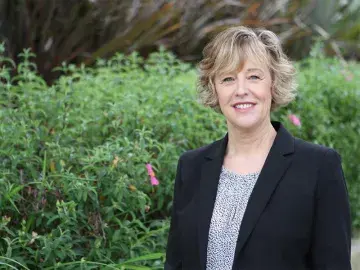As an Immigrant, SMU Graduate Understands Her Patients' Challenges
Osmary Hernandez arrived in the United States from Cuba unable to speak English. Now, 11 years later, she is helping other immigrants navigate an unfamiliar and complex healthcare system.
As a nurse case manager at La Clínica in Oakland’s Fruitvale District, Hernandez assists patients with chronic conditions — particularly diabetes — to adhere to their medication regimens and keep their health in check so they will stay out of the hospital.
“I love what I do,” says Hernandez, who earned her master’s degree in nursing from SMU last December. In May, while walking across the stage during the Commencement ceremony, she says she thought about “the example I can set for all other immigrants.”
Many of her patients at La Clínica are uninsured, few speak English, and some are unable to read — all barriers to maintaining good health. Recently, President Trump’s hard-line immigration policies have sent a chill through the community that is proving to be another major hurdle to wellness.
Hernandez says some patients stopped showing up to their medical appointments earlier this year because they were scared of deportation.
“They’re very anxious something will happen to them and they won’t be able to provide for their families,” she says. “That anxiety affects their health.”
She and her colleagues launched an education campaign to assure patients that they would not be turned over to immigration enforcement. Also, Hernandez worked closely with the clinic’s social workers to ensure that her patients gained access to immigrant advocacy services.
Though Hernandez earned a bachelor’s degree in Cuba, she had to start her education all over again when she joined her father in the United States in 2006 — and this time in a new language.
“It was hard,” she recalls of adjusting to life in an English-speaking country. “It’s hard not to be able to communicate.”
On top of that, Hernandez was separated for 10 years from her sister and mother, who remained in Cuba. They recently moved to California, just in time to see Hernandez graduate.
Her experience as an immigrant has made her more empathetic to the challenges facing the many Latino patients at La Clínica, where she began working four years ago as an administrative assistant. Nurse practitioners there encouraged Hernandez to pursue a nursing degree because of the need for more bilingual providers.
She says enrolling at SMU was “the best choice” she has made and helped her better understand people from different cultural and religious backgrounds. “I feel like Samuel Merritt did a great job of emphasizing culturally sensitive issues and tackling really well how to help the community from that perspective,” says Hernandez. “I’m so proud that the University is encouraging diversity and knows that we need a more diverse set of providers to serve our population properly.”
Because of her devotion to the La Clínica community, Hernandez resumed working there during the second semester of her SMU studies as a care transition nurse connecting patients to outpatient services after being discharged from the hospital. Patients told her they had missed her when she returned to the clinic.
“It’s a great feeling to know your patients and to know that they trust you,” she says.


